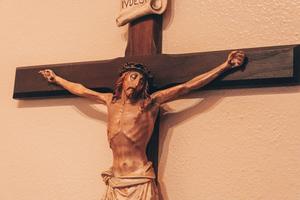Faith Is a Fruit-Bearing Tree
User’s Guide to Sunday, March 20

Sunday, March 20, is the Third Sunday of Lent (Year C). Mass readings: Exodus 3:1-8a, 13-15; Psalm 103:1-2, 3-4, 6-7, 8, 11; 1 Corinthians 10:1-6, 10-12; Luke 13:1-9.
Today’s Gospel contains a necessary balance. It speaks of God’s patience and care now, but also of the day of reckoning, the Day of Judgment. On that day, our “case” will be adjudicated by God; the decision is final — there is no turning back. Let’s look at this Gospel in two main parts:
Proclamation of the Problem
The Gospel opens: “Some people told Jesus about the Galileans whose blood Pilate had mingled with the blood of their sacrifices. Jesus said to them in reply, ‘Do you think that because these Galileans suffered in this way they were greater sinners than all other Galileans? By no means! But I tell you, if you do not repent, you will all perish as they did!’”
What Jesus is saying is that it is so easy for us to focus on the sins of others and fail to discern our own need for repentance and mercy. Every one of us needs boatloads of grace and mercy.
And so to our all-too-eager question, “What about them, Lord?” Jesus replies, “What about you? Stay in your own lane; work on your own issues, and leave their final fate to me. Punishment doesn’t just come to others; if you don’t watch out, it will come to you as well.”
He adds, “If you do not repent, you will all perish as they did!”
The Portrayal of the Process
The Lord then tells a parable that sets forth the process in which we are currently engaged: a process of patience and mercy that leads ultimately to the finality of judgment. Note the following steps:
Assessment: “There was once a person who had a fig tree planted in his orchard, and when he came in search of fruit on it and found none, said to the gardener, ‘For three years now I have come in search of fruit on this tree and have found none. So cut it down. Why should it exhaust the soil?’”
Faith is a fruit-bearing tree.
It is to bear the fruits of love, justice and the keeping of the commandments.
The Lord looks for these fruits and, often, through our conscience and by his word, assesses if such fruits are present.
Assistance: The text goes on to describe the prayers and requests of the gardener, “Sir, leave it for this year also. I shall cultivate the ground around it and fertilize it. It may bear fruit in the future.”
The Lord, the owner of the garden, not only grants the request but will also be the one to supply the necessary help to draw forth the fruits patiently awaited.
He has sent his Son, established the Church, given us the Scriptures, the liturgy and the sacraments, and every other good grace we need.
Acceptance: The parable ends very simply with this line: “If not you can cut it down.”
The word “acceptance” is used here carefully. Judgment is not so much God’s decision as it his acceptance of our decision to bear fruit or to refuse to do so; to accept or refuse his offer of the fruits of faith, such as chastity, mercy, forgiveness, reconciliation, love of the poor, and appreciation of the truth.
The Day of Judgment amounts to the day on which God accepts our final choice.
It is not so much the passing of a sentence as it is the final recognition of the absolute choice that we have made.
On this day, it is no longer possible for us to change. What we are remains fixed forever.














